January 6th is Twelfth Night,
traditionally the Last Day of Christmas, when festivities come to an end, the
decorations are taken down and things get back to normal. In Renaissance
England, Twelfth Night was marked in the houses of the wealthy by sumptuous
feasting, and Henry VIII introduced to his court the Italian custom of
celebrating with the performance of masques, elaborate costumed entertainments
that combined flowery speeches, song, dance and special scenery, and that were
really Mummer’s plays dressed up and polished for the elite.
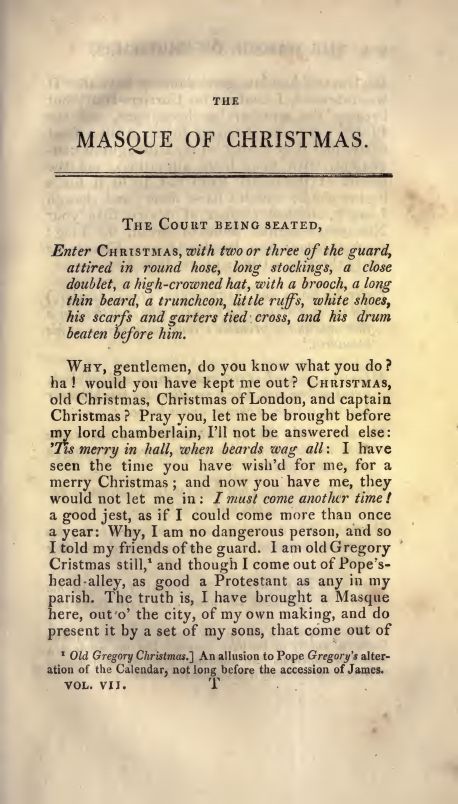 |
| Ben Jonson - The Masque of Christmas - 1616 |
Ben Jonson raised
the literary bar a little with his Masque of Christmas in 1616, but not
by much; it is what it should be, a light, frivolous short piece created to
raise laughter and provide a colourful spectacle for the court. The other
literary work associated with the feast-day is, of course, Shakespeare’s Twelfth
Night, a much, much better play that has little to do, per se, with
the season but does use the idea of disguise and the overturning of the social
order associated with the period to full effect.
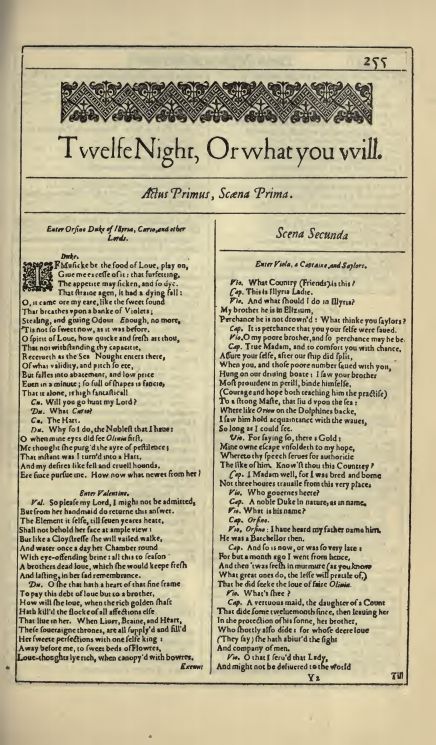 |
| William Shakespeare - Twelfth Night - First Folio |
One custom particular to
Twelfth Night was the King of the Bean, whereby a dry bean was baked into a
cake and whoever received the portion containing the bean was made King to rule
over the night’s revels (a character in Jonson’s Masque was named
Baby-Cake, and was attended by an usher bearing a cake containing a bean and a
pease).
“Now, now the mirth comesWith the cake full of plums.Where beane's the king of the sport hereBeside, we must know,The pea alsoMust revell, as queene in the court here.”
 |
| The King of the Bean holds court |
Cakes became associated with Twelfth Night and
the confectioners’ shops were filled with richly decorated cakes –
“Stars, castles, kings, cottages, dragons, trees, fish, palaces, cats, dogs, churches, lions, milk-maids, knights, serpents, and innumerable other forms”.
In
London there was a practice of the boys to gather around the cake shops,
waiting for the public to come and admire the wonders on offer in the windows.
Then, quickly and with great dexterity, the boys would either nail the hems of
coats or dresses to the wooden window frame, or pin two people’s coats
together, to the great laughter of the spectators and perpetrators. There were
times when up to eight or ten persons might be pinned together in one long line,
each struggling to escape the indignity, to the amusement of the boys.
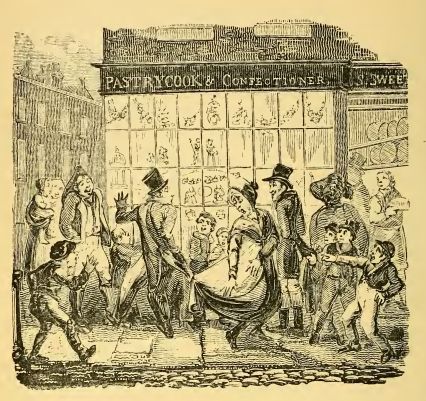 |
| Pinning clothes together |
“Such are the scenes, that, at the front and sideOf the Twelfth cake-shops, scatter wild dismay;As up the slipp'ry curb, or pavement wide,We seek the pastrycooks, to keep Twelfth-day”
John Brand, in his Observations on the
Popular Antiquities of Great Britain (1777), records how the country
farmers, with their friends and servants, would gather in the fields at six
o’clock in the evening of Twelfth Night and on the highest point of ground
would light a large bonfire surrounded with twelve smaller fires, and then
would drink to each other with old cider, wassail the apple trees to ensure the
next year’s harvest and return home. In the byre, a large cake with a hole in
the middle would be placed over the horn of the best bull and a toast drunk to
the animal, which would then be tickled until it threw off the cake. If the
cake went to the front of the beast, the master wins it but if it falls behind
then the mistress claims it; after this, the company goes back to the farmhouse
to drink and dance the night away.
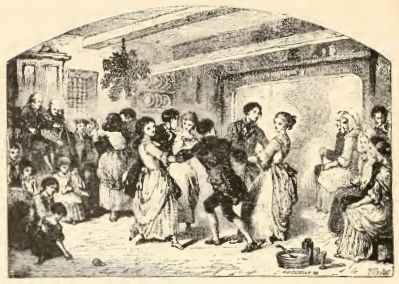 |
| Twelfth Night |
The
following day was called St Distaff’s Day, when labourers would go into the
fields, implements prepared and maybe even the oxen would be harnessed to the
plough. In the home, the women would ready their distaffs, preparing them to
begin to spin the wool, but after a few hours of this half-hearted business,
everything would be laid aside and a sort of half-holiday was declared, as
everyone took a rest to get over the Christmas festivities.
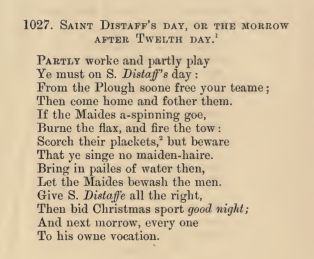 |
| R Herrick - Saint Distaff's Day |
“Partly worke, and partly play,Ye must on S. Distaff's day:From the plough soone free your teame,Then come home and fother them.If the maides a-spinning goe,Burne the flax, and fire the tow.”
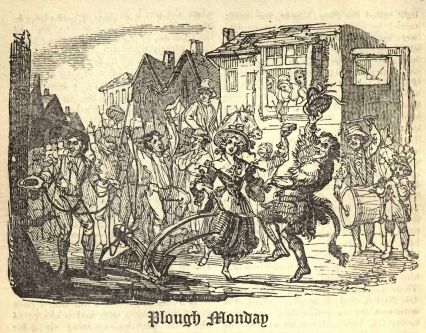 |
| Plough Monday |
The oxen would be unyoked but the following Monday
was known as Plough Monday, when the agricultural year began in earnest and
everything returned back to normal.
 |
| All hands to the Plough |
Christmas was over for another year.
 |
| January .... |
No comments:
Post a Comment